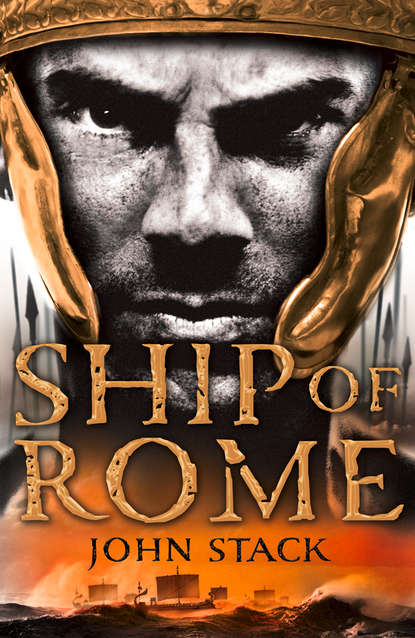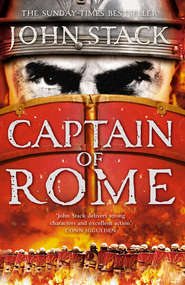По всем вопросам обращайтесь на: info@litportal.ru
(©) 2003-2024.
✖
Ship of Rome
Автор
Год написания книги
2019
Настройки чтения
Размер шрифта
Высота строк
Поля
Both Atticus and Septimus straightened up as once again all eyes in the room turned to them. Their course had been set…to Rome, to the centre of the Republic and the civilized world, escorting the most important man of the Republic.
‘We leave in one hour,’ Scipio said, dismissing the officers of the Aquila.
‘Marcus! You old bastard,’ Septimus called as he and Atticus entered the junior officers’ mess, immediately recognizing his old commander from the IV maniple of the Ninth.
‘Septimus!’
The two men met in the middle of the room and shook hands, smiling happily at each other, their meeting the first since the Battle of Agrigentum over a year before. Marcus was ten years older than Septimus, a tall, thin man and, although he was in the declining years of his prime, he still possessed an iron-hard physique and a will and discipline to match.
‘How is Antoninus?’ Marcus asked. ‘Still the same old tyrant?’
‘As hard as ever,’ Septimus replied, proud of his father’s reputation as one of the toughest centurions who had ever commanded a maniple of the Ninth.
‘Marcus,’ Septimus continued, turning to Atticus, ‘this is Captain Atticus Milonius Perennis of the Aquila.’
The centurion was about to proffer his hand but he stayed the gesture, his eyes suddenly unfriendly.
‘A Greek? By the gods, Septimus,’ he said, turning to the marine, ‘I cursed the day you accepted your promotion to centurion in the marines, but now I find you command with the very people your father and I fought at Beneventum.’
Atticus stepped forward, incensed by the unwarranted insult, but Septimus stepped into his path, his hand raised across Atticus’s sword arm.
‘Atticus has fought for the Republic for as long as I have, for as many years as half the men in this room. His loyalty is without question.’
Marcus was about to retort but he held his tongue, recalling the bond of friendship he had with Septimus and what a mentor Septimus’s father, Antoninus, had been. He slowly proffered his hand once more, his expression this time unreadable.
Atticus remained motionless, his own gaze hostile.
‘Any friend of Septimus’s is a comrade of the Ninth,’ Marcus prompted.
The words seemed hollow to Atticus; however, he shook the centurion’s proffered hand.
‘A naval captain, eh?’ Marcus asked, measuring him. ‘What brings you and this orphan of the Ninth to our camp?’
‘Grave news,’ Septimus said, recapturing Marcus’s attention, all humour now gone from his voice.
Marcus indicated a crowded table with a nod of his head and all three sat down. The other centurions looked on in silence, many leaning in to hear the news that had wrought such a change in the expression of the young marine.
‘Go on…’ Marcus said, prompting Septimus to begin.
‘Carthaginians,’ he began, ‘a whole fleet of them, Marcus. Off the northern coast. We expect a full blockade within weeks.’
‘Merciful Jupiter,’ Marcus breathed.
The centurion was a keen disciple of logistics, as were all centurions by necessity. The success and readiness of his maniple depended in large part on how well it was supplied. No supplies meant no replacements of armour, weapons, and the myriad simple but necessary items needed to keep a modern, effective army in the field.
‘So what’s the plan?’ Marcus finally asked, breaking the silence, the younger centurions deferring to the most experienced man in the room.
‘We sail for Rome…’ Septimus replied ‘…to escort the senior consul to the Senate.’
‘And the legions?’
‘Scipio ordered that the legions must act as if nothing has changed,’ Septimus said, remembering the senior consul’s words in the earlier meeting, ‘so the Ninth and Second will march out to battle as planned.’
‘We’ll march out as planned all right,’ Marcus remarked, anger in his voice as forces beyond his control threatened to place a stranglehold on his legion, his maniple, his men, ‘but if a blockade is enforced those plans will rapidly change. We’ll become survivors not fighters, scavengers of food instead of hunters of men.’ The room went quiet again as each man contemplated this change of fortune.
‘Septimus,’ Marcus said suddenly, a hard edge to his voice, ‘Antoninus was like a father to me and to serve as optio in his maniple at Beneventum was an honour I was proud to repay when I promoted you to my second-in-command. I know there was another reason behind your acceptance of a promotion out of the Ninth and into the marines after the Battle of Agrigentum, and I also know you are a man like your father, a man of honour.’
Septimus nodded, remembering the strength of the bond between the two senior officers of every maniple.
‘As my optio I always had your back and you had mine,’ Marcus continued. ‘I call on that bond again, Septimus. If a blockade develops, you and your captain must break it. Whatever needs to be done, you need to do it. We’re facing six months of fighting and I need to know that you have our backs covered, that you’ll make sure we can fight on and not be hamstrung by the Carthaginians.’
Marcus stood up as Septimus nodded his assent.
‘Do I have your word?’ he demanded, his tone that of a maniple centurion, a commander of one hundred and twenty men.
Septimus stood opposite him.
‘Yes, Centurion,’ he replied, their ranks equal but Marcus’s experience commanding and earning Septimus’s respect.
Marcus looked to Atticus, noting the hard expression on the younger man’s face.
‘And you, Greek. Will you fight for the legions?’
Atticus stood up slowly beside his friend.
‘I’ll fight,’ he replied simply after a moment’s pause.
‘Good,’ Marcus said.
Marcus extended his hand and Septimus shook it solemnly. Atticus paused for a heartbeat before following suit, his hesitation raising a sly smile at the edge of Marcus’s mouth.
‘What’s the name of your ship?’ Marcus asked.
‘The Aquila,’ Atticus replied, his back straightening.
Marcus nodded, noting the name. ‘Good hunting, men of the Aquila,’ he said.
‘Give ‘em cold iron, wolves of the Ninth,’ Septimus replied, his connection to the legion that forged him giving intensity to his words, and for an instant he yearned to be once more in the ranks of the IV maniple. The strength of his will caused every man in the room to stand without command. Septimus and Atticus saluted them and they returned the salute in unison…all except Marcus. For a moment his eyes locked with Septimus’s and the marine saw the veteran centurion nod imperceptibly, the gesture a reinforcement of the words spoken moments before. The Second and the Ninth, the Bull and the Wolf, would march from this camp onto the battlefields of Sicily. Two creatures born to battle, these beasts would fight, but they would also consume, their strength drawn from their supplies, without which they would weaken and be overcome by the very prey they sought. Their strength was now the responsibility of Septimus, and he would give his life to protect it: not because the Republic of Rome demanded the sacrifice, but because the men of the legions, men like Marcus, asked for it.
CHAPTER THREE (#ulink_68f252fa-511b-5c72-95c3-58562aacf5b7)
The returning column from the legion encampment reached the dockside at Brolium an hour before sunset. With a curt command, Scipio dismissed the officers of the Aquila with orders to be ready to sail at dawn. He turned his horse in the direction of the villa and continued up the narrow winding streets of the port town, the way ahead deserted as before. Within minutes he was in the courtyard of the villa and Scipio dismounted before dismissing his guard.
The senior consul made his way to his quarters, where he was met by his personal aid, the Nubian slave Khalil, whom Scipio had personally chosen from the slave markets of Rome; he was accompanied by two female slaves carrying fresh towels and warm, scented water. Before his appointment to the Senate, Scipio had been a fighting man by profession. His social position in the patrician class had afforded him the opportunity to join the legions as a tribune, but within ten years, by the time he reached twenty-eight, his aggression and ambition had taken him to the rank of legate, the overall commander of a Roman legion. He had used this position and his influential family connections to enter the Senate, where now, at only thirty-five years old, he held the position of senior consul, the highest elected official of the Republic.
Although the battles he fought in the Senate against the other ambitious men of Rome were as fierce as any he had faced on the battlefield, they lacked the element of physical danger, of pitting one man’s strength against another’s. It was a sensation he relished, and he now lived it vicariously through the fighting men he trained for the arena. Khalil was one of his current stock, a tall, sinewy, powerfully built Nubian whose eyes, although clear and open, seemed to hide a defiant streak that came from having been taken in slavery and not being born to it. Scipio had bent this man to his will, knew he would now kill at his command, but he also knew that it was dangerous to keep such a man in his household, to turn his back on him, to allow him even to approach while he slept. It was this danger, this element lacking in the Senate, that Scipio found intoxicating. It had driven his career in the legions and it had drawn him now to the battlefields of Sicily, to be once more around the fighting men of Rome.
Scipio allowed Khalil to help him undress and the female slaves washed his body before massaging warm oil into his upper torso. They dressed him in a clean white linen tunic and then stood back against the door, waiting for his next instruction.









